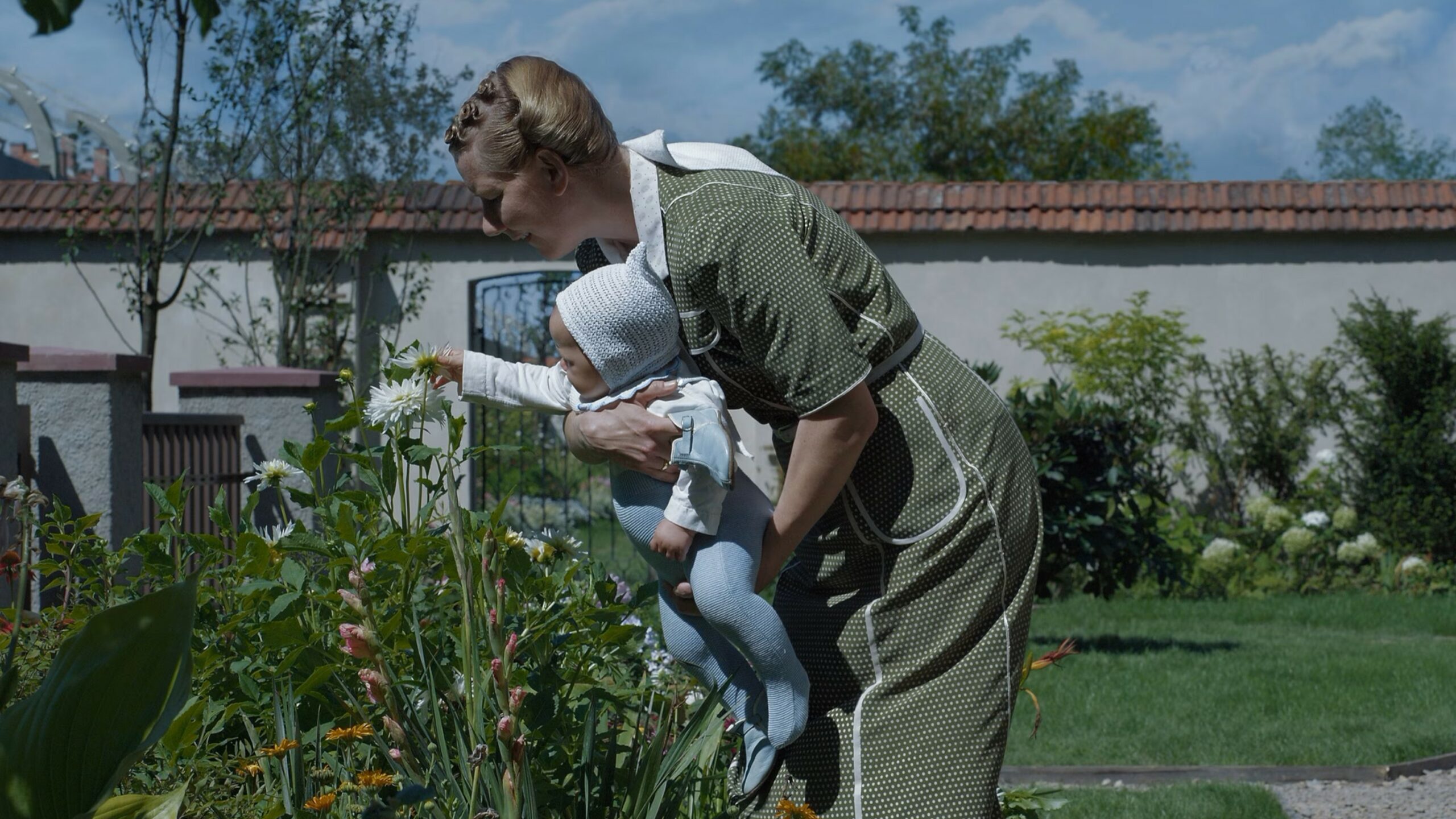
Director: Jonathan Glazer
Writers: Jonathan Glazer (screenplay), Martin Amis (novel)
Cast: Christian Friedel, Sandra Hüller
Producers: Ewa Puszczynska, James Wilson
Music: Mica Levi
Cinematographer: Łukasz Żal
Editor: Paul Watts
Cert: 12
Running time: 105mins
Year: 2023

What’s the story: Auschwitz commandant Rudolf Höss (Friedel) and his wife Hedwig (Hüller) delight in their perfect family life in their beautiful home. A home within “the zone of interest”, the restricted area around the death camp.

What’s the verdict: With supermarket shelves typically sporting at least one “(Noun) of Auschwitz” book, there is a growing danger of pop culture blunting the Holocaust. Particularly the further away we travel from World War 2.
Jonathan Glazer’s The Zone of Interest, his first film since 2013’s Under the Skin, is something to be celebrated then. Although it keeps atrocity offscreen – the Holocaust conveyed via furious shouting, terrified screaming, pops of gunfire, and the ever-present rumble of crematoria furnaces – the film’s disturbing power lingers for days. Chiefly due to the diabolical juxtaposition at the film’s core: that a family can find contentment and joy at the mouth of Hell.
Through keeping the horrors relegated to the soundtrack, Glazer depicts something often absent from films on the subject: the brutal, all-encompassing cynicism of the Holocaust. The dehumanisation of prisoners kept alive for slave labour. The ashes of the murdered used to fertilise flower beds. Industrialists bidding enthusiastically for lucrative contracts to construct ever-more efficient ovens. The daily ritual of looting victims’ possessions. Sandra Hüller’s Hedwig poses in a dead woman’s fur coat, and delights in telling other wives about finding diamonds hidden in toothpaste. Auschwitz commandant Höss counts out vast sums of stolen bank notes, while in voiceover a letter from a high-ranking officer declares him a paragon of National Socialist ideals. Even his nightly routine of double checking all doors are locked is tacit acknowledgement of the crimes he is committing both inside his house and just beyond the barbed wire topped wall outside.
This cynicism extends to how Auschwitz and the network of camps swiftly became a vital part of the Nazi economy. The dialogue is peppered with references to corporations such as Siemens and IG Farben. The SS talk of CEOs sending “fan mail” about how well camp labour targets are being met.
Glazer jettisons all but the basic premise of Martin Amis’ 2013 source novel, but because of moments like these his film is a stunning adaptation. The book’s black comedy is gone, but its outrage remains. Along with the (again, cynical) euphemistic language used to describe the genocide. One commandant is bemoaned for not being “energetic” enough for the required work. Höss is commended for how effectively he transforms “theory into practice”.

As stark as the film’s themes are its visuals. Largely using fixed, hidden cameras, Glazer and cinematographer Łukasz Żal create a nauseous atmosphere of claustrophobia. Haunting sequences of a local girl hiding food for prisoners are shot with a thermal imaging camera; in the zone of interest goodness looks truly alien. Credit also to production designer Chris Oddy for creating what should be a dream home, but whose harsh angles, glaring white colour scheme, and large windows overlooking the horror make it wholly unappealing. Johnnie Burn’s complex (Oscar nominated) sound design tells the real story behind the idyllic family scenes, and leaves you wincing. Complementing this is Mica Levi’s score, punctuating the film like an infernal communique from the other side.
Some audiences may balk at the austere style, but it is crucial to the film’s power. And in a piece of dark irony, the filmmakers have acknowledged the influence of reality TV on the film’s look. The surveillance atmosphere echoes both the scrutiny of the Gestapo and the voyeuristic fascination of Big Brother or The Traitors.
None of this would work without superlative performances from the leads. Christian Friedel is chilling as a man who approaches genocide as merely good project management, wounded when threatened with re-assignment. Hüller is equally disturbing as a woman who can show off her prize azaleas against a backdrop of complete despair, delighting in her nickname, “The Queen of Auschwitz.” As impressive here as in Anatomy of a Fall, her icy performance captures the mindset of someone who sleeps peacefully through her own baby’s cries because she is so inured to the screams of children.
Scenes with the Höss brood are equally unsettling. Be it the elder son poring over his collection of gold teeth, or the youngest, who flinches from, then quickly reconciles himself to seeing his father order a prisoner’s death.
Rather than a study of monsters, The Zone of Interest captures the terrible humanity of the perpetrators; that diabolical knack humankind has for adapting to the unthinkable, particularly when personal gain is involved. A shattering coda throws what we have seen into an even more immediate and raw context. It is a monumental close to what will surely be one of the year’s best films.
Rob Daniel
Letterboxd: RobDan
Podcast: The Movie Robcast
